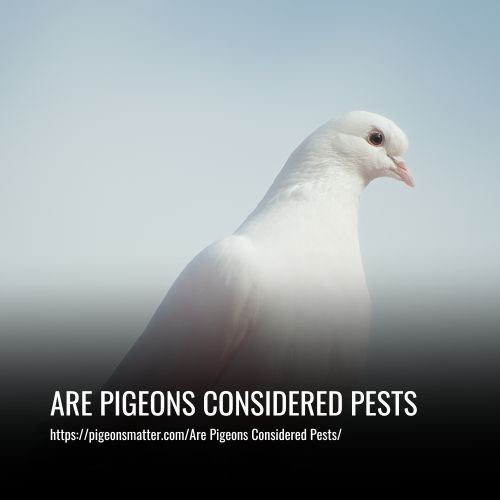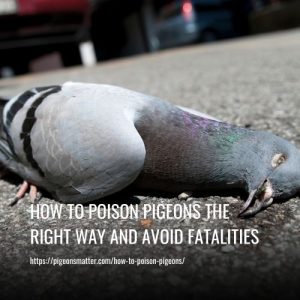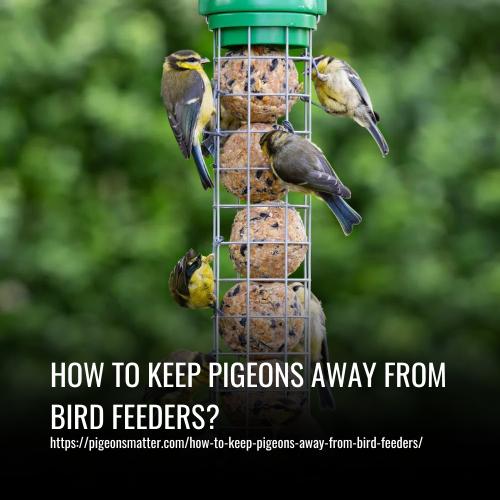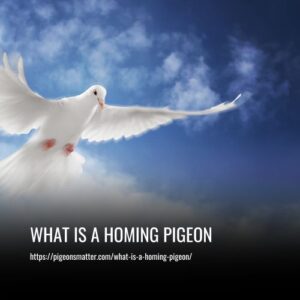Pigeons are considered pests in many areas due to their ability to spread diseases, their tendency to roost and nest in buildings, and the damage they can cause to property. They are often considered a nuisance and can be difficult to control.

Why Is The Pigeon Considered A Pest?
Pigeons are often seen as city birds with no real purpose, but they do serve a role in the ecosystem. They are originally from cliffs and rocky areas but have adapted to living in cities where they scavenge for food. They also play a role in seed dispersal and as prey for other animals.
Despite their role in the ecosystem, pigeons are often considered pests. They can carry diseases and their droppings can cause damage to buildings and create unsanitary conditions. This is why wildlife removal professionals are often called to remove them from urban areas.
The pigeon’s reputation as a “flying rat” is largely due to their scavenging behavior and the fact that they are often found in urban areas. However, they are not related to rats and do not pose the same health risks.
How Did Pigeons Become Such Pests?
Pigeons have a notorious reputation as pests, but this was not always the case. While some birds are kept as pets or tracked for their beauty, pigeons are often viewed as dirty, destructive, and a nuisance. They are sometimes compared to rats due to their prevalence in urban centers and residential areas. But how did pigeons become so reviled?
The history of pigeons shows that they were once highly valued as messengers and even kept as pets by aristocrats. However, with the growth of cities and the increase in human populations, pigeons began to thrive in urban environments, where they found ample food and shelter. As their numbers grew, so did the problems they caused.
1. Pigeons Have A Better Pedigree Than You Might Expect.
Pigeons have a rich history dating back to their origins as rock doves living on cliffs. They were eventually domesticated and lived in nesting houses near homes in both urban and rural areas, being used for food and religious sacrifices.
Observing the behavior of pigeons in captivity, humans recognized their intelligence, monogamous mating habits, parental care, and homing instincts. These qualities made pigeons highly valued and inspired humans to train them.
Messenger pigeons have been used throughout history, including in World War I where they were known as “thoroughbred messengers of the sky.” These birds played a vital role in delivering messages, with stories of pigeons continuing to deliver messages even after sustaining injuries.
2. Fancy Pigeons And Homing Pigeons Are Still Embraced.
Pigeons are a popular bird breed that comes in two types: fancy pigeons and homing pigeons. Humans have been able to manipulate the characteristics of these birds through breeding, resulting in the creation of fancy pigeons with specific colors and feather styles. Fancy pigeons were initially popular among the wealthy, but the hobby soon spread to working-class people. Today, fancy pigeons are still a hobby, but they are less popular than before. Fancy pigeon shows and competitions are held worldwide.
Homing pigeons are another type of pigeon that are often trained and bred for sport. Pigeon sports clubs exist where homing pigeons race. This hobby is expensive, limiting it to a select group of people across the globe. A flock of birds bred from a successful racing pigeon can net as much as $100 million. Mike Tyson is a prominent member of the homing/racing pigeon community.
3. Feral Pigeons Are The Ones That People Consider To Be Pests.
Feral pigeons are a common sight in cities and neighborhoods. These pigeons are descendants of domesticated pigeons and are considered undesirable due to their destructive nature and disease-spreading abilities.
4. Destructive Nature:
Feral pigeons travel in large groups, causing damage to property with their acidic waste. They can also cause structural damage to buildings they nest in, making them a nuisance for property owners.
5. Disease-Spreading Abilities:
Pigeon droppings are known to carry bacteria, fungi, and viruses that can cause infections, including fatal cases for those with reduced immunity. Their disease-spreading abilities make them a health hazard and a cause for concern for property owners.
6. Strong Homing Abilities:
Feral pigeons have strong homing abilities, making it difficult to get rid of them permanently. However, it is possible to remove them safely and effectively with the help of professional pigeon control services.
7. Descendants of Rock Dove:
Despite the differences in perception between feral pigeons and fancy or homing pigeons, Charles Darwin proved that they are all descendants of the rock dove.
Are Pigeons Dangerous to Have Around?
Pigeons have become a pest due to their large numbers and lack of natural defense mechanisms against predators. Despite having numerous predators, their numbers continue to grow, making them a real danger to human environments.
They shed parasites with their feathers and droppings, build nests in inconvenient places, and cause slip-and-fall accidents with their droppings. Pigeons also pose a serious hazard to air travel, as they can get sucked into jet engine intake fans or fly into windshields. They deface public monuments with their constant defecation, which corrodes the monuments and ruins them for future generations.
Additionally, large groups of pigeons can damage machinery such as HVAC units, generators, and other machines that require cooling fans by clogging intakes, filters, and fans. It’s important to take measures to control their population and prevent them from causing harm to people and property.
Illnesses Transmitted by the Pigeon
Pigeons may be a nuisance when they infest monuments, leaving behind their droppings, but the real danger lies in the diseases they carry. These diseases can be transmitted to humans, pets, and livestock, making them a serious health risk. In addition to fatal diseases, pigeons can harbor fungi and carry pests such as fleas, lice, ticks, mosquitos, and mites in their feathers. The nests they keep are also a breeding ground for pest insects, making them even more dangerous. Here are some of the diseases that pigeons carry and transmit, making them a serious pest:
- Histoplasmosis.
- Salmonella.
- Ornithosis.
- Avian Flu.
- West Nile Virus.
- Eastern Equine Encephalitis.
- Chlamydiosis.
- Toxoplasmosis.
- Tuberculosis.
- Cryptococcosis.
- Yersiniosis.
These diseases can be transmitted through the birds, their nests, droppings, and other means. If you notice pigeons roosting on your property, it’s important to call for immediate removal to prevent the spread of these dangerous diseases.
Help for Preventing Pigeons
Pigeons can be a nuisance around your home or business, but there are ways to limit their presence. By removing things that attract pigeons, you can reduce their numbers and prevent them from nesting in the area.
1. Removing Bird Feeders and Food Droppings:
Pigeons will eat just about anything, so removing bird feeders and ensuring that food droppings are cleaned up promptly can help reduce their numbers. If you work with a restaurant, make sure that dumpster lids are tightly closed to prevent pigeons from accessing any leftover food.
2. Eliminating Resting and Nesting Areas:
Pigeons like to rest and nest in areas that are sheltered from the elements. Using humane spikes or fishing lines can prevent them from perching on ledges or rooftops. This will discourage them from nesting in your area.
3. Scaring Them Away:
Motion-censored sprinklers or high-powered water guns can be used to scare pigeons away. Loud noises can also be effective. By making the area uncomfortable for pigeons, they will be less likely to return.
4. Removing Standing Water:
Pigeons are attracted to standing water and birdbaths. By removing these from the area, you can reduce the number of pigeons in the area.
Effective Pigeon Control
If you have eaves or ledges, you may have a pigeon infestation. These birds, also known as rock doves or rock pigeons, are often found on coastal rocks searching for food. However, it’s essential to prioritize safety when it comes to pigeon control. To ensure the safety of yourself and the birds, it’s best to hire a professionally licensed and trained wildlife removal company to alleviate the infestation.
FAQs
There are a few reasons why you may have pigeons around your property. They are attracted to sources of food and water, so if you have bird feeders or open water sources, pigeons may be drawn to them.
Additionally, if there are nearby buildings or structures with ledges or other areas for roosting, pigeons may choose to nest there.
Studies have shown that pigeons can carry and transmit various diseases, including chlamydiosis, histoplasmosis, yersiniosis, salmonellosis, toxoplasmosis, and tuberculosis. Additionally, their droppings may contain the fungal disease cryptococcosis, which can pose a significant health risk, particularly for individuals with weakened immune systems.
Pigeons are commonly regarded as a nuisance and urban pest, but it’s important to adhere to regulations when removing them. Hiring a licensed pest control service will ensure the legal elimination of your pigeon issue.
Pigeons are often considered pests due to their prolific breeding, roosting habits in urban areas, and their tendency to create unsanitary conditions. Their droppings can damage buildings, monuments, and vehicles, leading to structural damage and health concerns.
Pigeons can be a nuisance because they gather in large numbers, creating messes with their droppings. Their nesting and roosting habits often lead to clogged drains, health hazards, and property damage.
Yes, pigeons can pose health risks. Their droppings contain uric acid that can corrode surfaces and also harbor fungi, bacteria, and parasites. Inhalation of dried pigeon droppings can cause respiratory issues, and contact with droppings can lead to diseases such as histoplasmosis and cryptococcosis.
There are various ways to deter pigeons. Installing physical deterrents like spikes, nets, or wires on ledges and surfaces where pigeons roost can discourage them. Additionally, using scare tactics like decoys or sound deterrents may also help in keeping them away.
Regulations on pigeon removal or harm can vary based on local laws and jurisdictions. In many places, it’s legal to deter or discourage pigeons using non-lethal methods like deterrents, but harming or killing them may require specific permits or professional assistance.
Yes, there are humane methods to manage pigeon populations. Implementing exclusion techniques, like blocking access to roosting sites without causing harm, utilizing bird spikes or nets, and providing alternative food sources away from buildings, can help manage pigeon populations without resorting to harm.
Conclusion:
While some may consider pigeons to be pests, it’s important to remember that they are living creatures that play an important role in our ecosystem. Instead of viewing them as a nuisance, we should strive to coexist with them in a way that is respectful and humane.
So next time you see a pigeon, take a moment to appreciate its unique beauty and contribution to our world.


